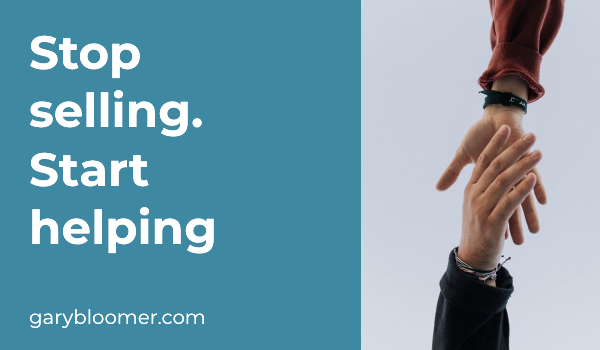ARTICLES | SMALL BUSINESS MARKETING STRATEGY
Stop selling, start helping

By Gary Bloomer
DISCLAIMER: This post contains affiliate links. If you use these links to buy something I may earn a commission. Thanks.
Obviously, we all need to make sales to generate revenue.
No revenue, no money.
No money, no bills paid; nothing in the bank, nothing tucked away for retirement.
You get the idea.
However, does selling (and generating revenue) always have to equate to sell, sell, sell?
My argument is that it doesn't.
My contention is that it's better to do less selling.
My belief—my commitment if you like—is that it's possible to generate revenue, that it's possible to sell and to sell well (while selling more in the long run), by avoiding the hard sell by doing something that's counter intuitive.
By helping people.
Ultimately, and at its core, that's what sales and business are mostly about: your skills, abilities, experiences, and talents have a specific value, a particular kind of leverage that's represented by an element of value in the guise of time saved vs money spent, and it's that value that helps someone solve their problem.
Sure, someone could install their own deck, or plumb in their own hot water heater, or service their own car, or figure out their own taxes, or landscape their own garden, drive themselves to the airport, make their own pizza, and a gajillion other things—but when there is someone else with a specific skill, or a certain degree of experience or acumen who can do the job for you and do it quicker, more thoroughly, with greater professionalism, and with greater ease—all for a price, and all while saving you time and costing you less than if you were to attempt to do the job yourself—then you are helping that person solve a problem.
To sell without selling then, it logically follows through that the more you can help—and more specifically, the easier you can make someone's decision to choose your helping skills—the less overall selling you will need to do and, in theory at least, the more business you will generate.
Sadly, few people care about your product, or about how long you've been in business, or about how you won't be beaten on price, or about which TV shows you've been on.
-------------------------------------------
This is where the worlds of effective small business marketing, marketplace demand and visibility, and buyer intent meet.
-------------------------------------------
They care about their problem and they care about solving that problem and solving it quickly, fully, and cost effectively.
As markets shrink and competition increases, the established "Roll up! Roll up! Get your bargains here!" approach, or worse still, the approach of "Take it or leave it!" works less and less.
What works instead?
The belief on the parts of clients and customers that they've found someone who's obsessed with providing consumer centric messaging that follows through on every level of service.
This is where the worlds of effective small business marketing, marketplace demand and visibility, and buyer intent meet.
When it's a meeting based on getting the most money out of the client or customer in the shortest period of time with the least amount of hassle no matter what, it generally winds up being a pretty short term relationship.
While doing business like this might be fine if there's a constant churn of new clients coming in as old ones stagger way, wondering what happened, it might be an OK business model for a while. But at some point the wheels are going to fall off, business is going to dry up, and things won't look that rosy.
But, when it's a meeting based on mutual respect, trust, and belief—when it's a meeting based on value that helps, a meeting in which the client's long term experience increases the effectiveness of every penny spent on marketing through glowing testimonials and recommendations, then it's a meeting that becomes less confrontational and adversarial and it becomes more an enjoyable dance of equals—and all based on helping the client or customer:
- make informed decisions and choices.
- feel empowered and intelligent.
- assured of their outcome.
- fulfilled in their investment.
- excited by the possibilities.
- overcome their fears and objections
- reverse risk.
- gain peace of mind.
- willing to replicate their experience.
This isn't namby-pamby, airy-fairy nonsense.
It's been proven to work time and again.
If you disagree then fine, this probably isn't the website for you.
If you'd like to learn more, if you think there's something in this idea and that I'm not completely barking mad, sign up for useful tips, strategies, and ideas.
You never know, we might both learn something!
About Gary Bloomer
Gary Bloomer is originally from the UK. These days he lives just outside Philadelphia. Since 2009, he's answered over 5,000 marketing, branding, and social media strategy questions from small business owners from all over the world on the Know-How Exchange of MarketingProfs.com. His website is a love letter to the world of small business marketing.
To learn more or to get in touch, read the About page.
Share this article:
Ready to outsmart your competition? SUBSCRIBE!
© garybloomer.com | Verified by HONESTeOnline.com